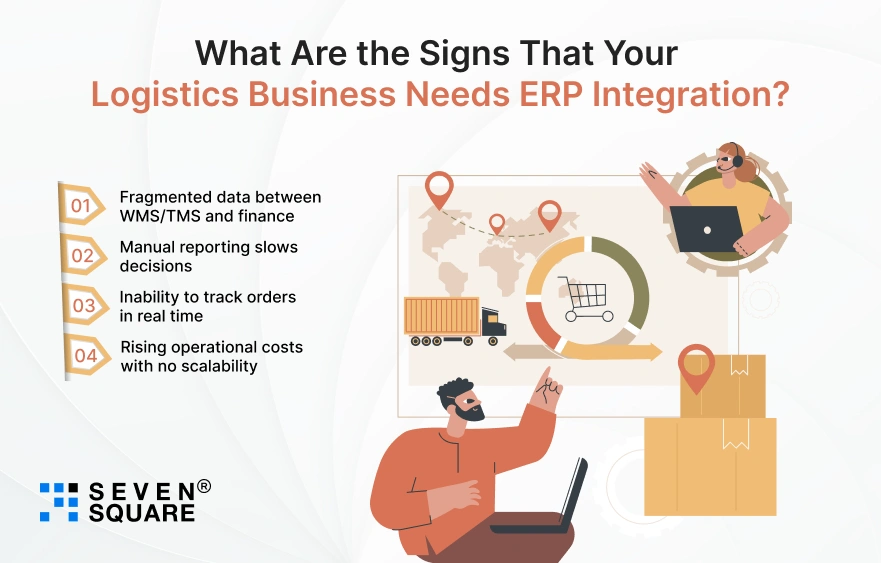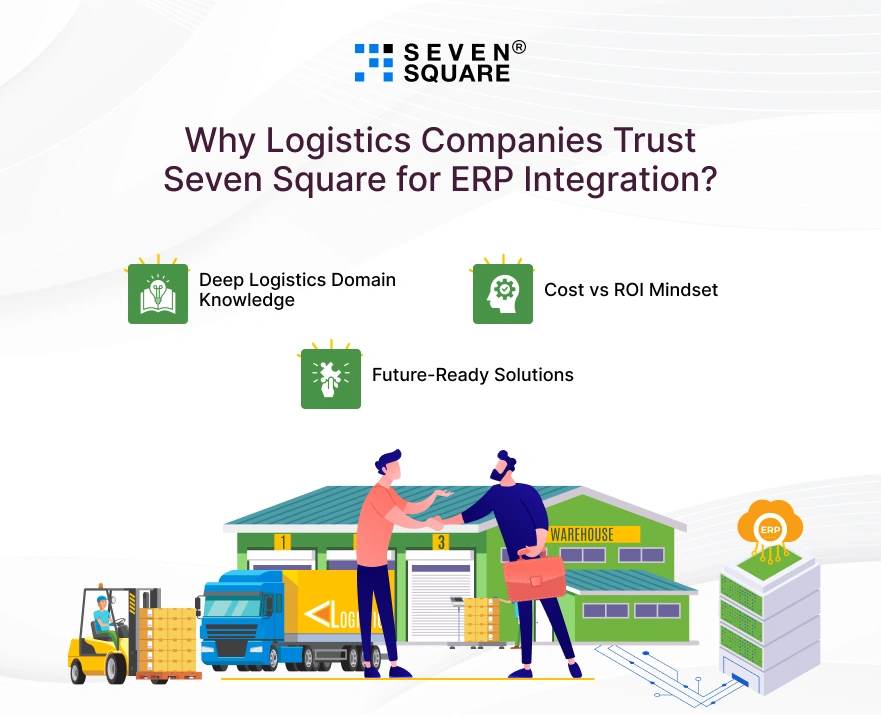Running a logistics business today means handling multiple systems.
From warehouse management systems (WMS) and transport management systems (TMS) to order tracking, invoicing, and fleet monitoring.
Without the right ERP logistics integration, these systems work in silos, slowing down operations, increasing costs, and frustrating customers.
ERP integration services for logistics have become the missing piece that ties everything together.
Businesses that invest in logistics ERP integration experience faster order fulfillment, optimized route planning, and smooth ERP WMS TMS integration.
At Seven Square, we specialize in building ERP integration for logistics companies that go beyond just technology.
We focus on reducing logistics ERP implementation costs, delivering measurable ROI, and helping you stay competitive in a fast-changing market.
If you’re looking for an ERP integration service provider that ensures accuracy, scalability, and speed, this blog will show you why ERP integration is the game-changer for your logistics business.
What Is ERP Integration in Logistics? (And Why It’s Important in 2025?)
Simply put, ERP integration for logistics means connecting your logistics tools (WMS, TMS, YMS, telematics) with your Enterprise Resource Planning (ERP) system.
Instead of juggling multiple disconnected systems, your team manages everything, from orders to payments, inside one connected platform.
With ERP logistics automation, you get real-time inventory updates, automated order fulfillment, and accurate financial reporting without manual intervention.
Even better, supply chain ERP integration future-proofs your business, allows AI demand forecasting, predictive ETAs, and process automation.
Learn the importance of AI in Logistics.
What Are the Signs That Your Logistics Business Needs ERP Integration?

Not sure if your logistics company really needs ERP integration?
Here are some warning signs we at Seven Square often find during client consultations:
- Fragmented data between WMS/TMS and finance: Your warehouse and transport teams work on different systems to make reporting painful.
- Manual reporting slows decisions: Leaders spend days preparing reports instead of focusing on growth.
- Inability to track orders in real time: Customers demand live updates, but your systems can’t deliver.
- Rising operational costs with no scalability: Costs go up as you grow, but efficiency doesn’t.
That’s when businesses usually explore ERP logistics implementation services.
They also ask about ERP logistics pricing and the ERP integration cost for logistics projects.
The ROI from reduced errors, faster operations, and real-time visibility often exceeds the upfront investment.
Learn Why Cloud-based Logistics is the Future of Delivery Operations.
How ERP Integration Solves the Biggest Challenges in Logistics?
When done right, ERP integration services for logistics provide some of the most useful benefits:
- Real-time visibility ERP logistics: Get a single dashboard for orders, inventory, fleet, and finances.
- Cost control and optimization: Automated workflows reduce labor hours, prevent errors, and cut unnecessary costs.
- Faster fulfillment & dispatch: Orders move from ERP to WMS/TMS instantly to ensure quick turnaround.
- Scalability for multi-warehouse operations: Whether you’re managing one or ten warehouses, your ERP scales smoothly.
We help logistics companies implement ERP integration for order fulfillment so that every shipment reaches the right customer, at the right time, without delays.
ERP + Logistics Tech Stack: What Gets Integrated?
Every logistics business uses a different mix of tools. The real value comes when these systems are integrated with ERP.
Here’s what we usually connect for clients:
- WMS integration: Improves warehouse efficiency by syncing inventory levels, stock movements, and orders directly with ERP.
- TMS integration: Provides transport planning, route optimization, and delivery tracking.
- YMS integration: Simplifies yard operations, dock scheduling, and reduces bottlenecks in loading/unloading.
- Telematics/IoT integration: Connects fleet monitoring tools with ERP for real-time vehicle tracking, fuel usage, and predictive maintenance.
This is where WMS TMS ERP integration, yard management ERP integration, and telematics ERP logistics integration turn into a connected, intelligent logistics ecosystem.
What Are the Most Popular ERP Vendor-Specific Logistics Integrations?
We specialize in vendor-specific ERP integrations that make your logistics tech stack work smoothly.
1. SAP ERP Logistics Integration
- Strengths: Deep functionality for supply chain, global scalability, strong compliance support.
- Drawback: Can be expensive and complex without expert consultants.
2. Microsoft Dynamics 365 logistics integration
- Strengths: Flexible cloud-first ERP, strong analytics, smooth integrations with Office 365 and Power BI.
- Drawback: Customization may be needed for complex logistics workflows.
3. Oracle ERP logistics integration
- Strengths: Strong financial + supply chain capabilities, powerful AI-driven features.
- Drawback: Higher total cost of ownership for smaller logistics firms.
4. Odoo logistics ERP integration
- Strengths: Open-source, modular, cost-effective, perfect for SMB logistics companies.
- Drawback: May require customization for enterprise-level operations.
We help you to provide the best ERP integration approach based on your logistics business size, budget, and growth goals.
How to Choose the Right ERP Integration Partner for Logistics?
Choosing an ERP system is one thing. Choosing the right ERP integration partner is what makes it successful. Here’s what to look for:
- Experience in logistics domain: Not every ERP consultant understands logistics workflows. Our team specializes in supply chain, WMS, TMS, and fleet operations.
- API/EDI expertise: Modern integrations often require APIs for real-time updates and EDI for traditional freight forwarding. We cover both.
- Post-implementation support: Integration is not “done” at go-live. Continuous monitoring, training, and upgrades matter.
- Cost vs ROI mindset: A good partner won’t just talk about cost. They’ll show you how the investment pays back in efficiency and savings.
Why Logistics Companies Trust Seven Square for ERP Integration?

We go beyond being a regular ERP integration service provider by offering domain-specific expertise and proven success in the logistics industry.
- Deep Logistics Domain Knowledge: From WMS, TMS, and YMS integration to supply chain automation, our team ensures your ERP roadmap matches your real-world processes.
- Cost vs ROI Mindset: We focus on reducing logistics ERP implementation costs while maximizing efficiency, automation, and ROI, so you see value from day one.
- Future-Ready Solutions: With innovations like AI ERP logistics integration and predictive analytics, we prepare your business for the future of ERP in logistics.
Want to Get Logistics ERP Integration Services? Contact Us Now!
What Are the Common ERP Integration Mistakes in Logistics? (and How to Avoid Them?)
Over the years, we’ve seen businesses struggle because of the same mistakes. Here are the big ones:
- Not matching ERP with business processes: Customizing ERP without mapping your actual workflows leads to poor adoption.
- Poor data migration: Incomplete or inconsistent data creates chaos post-integration.
- Ignoring change management: If employees aren’t trained, even the best ERP integration fails.
Our development team builds an ERP integration roadmap for logistics that avoids these pitfalls.
We plan data migration, workflow alignment, and team training to ensure you don’t fall into common ERP integration failures.
Is ERP Integration the Missing Piece in Your Logistics Puzzle?
Logistics businesses today face delays and inefficiencies. The solution isn’t another standalone tool, its ERP integration for logistics companies.
With the best ERP integration approach, you gain:
- Real-time visibility across warehouse, transport, and finance.
- Scalability for multi-warehouse operations.
- Cost savings through automation and optimization.
FAQs
- ERP integration in logistics means connecting ERP with WMS, TMS, and YMS to unify operations and improve efficiency.
- ERP provides real-time visibility, automates reporting, and reduces manual errors to make logistics faster and more cost-effective.
- The ERP logistics pricing depends on vendor, customization, and project scope. Costs vary, but ROI usually outweighs investment.
- Yes, you can integrate ERP with WMS and TMS for warehouse and transport, plus YMS for yard operations.
- Data migration, workflow alignment, and training are the biggest challenges, but a strong roadmap solves them.